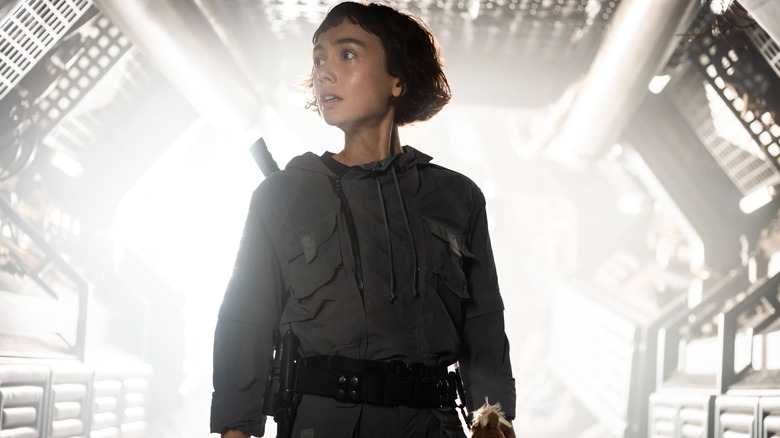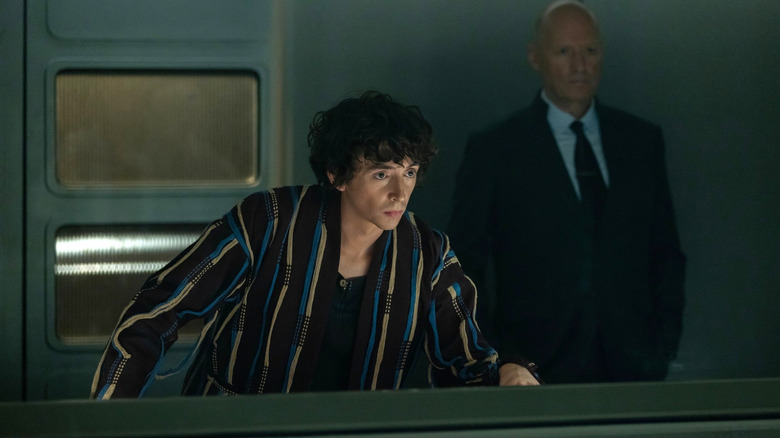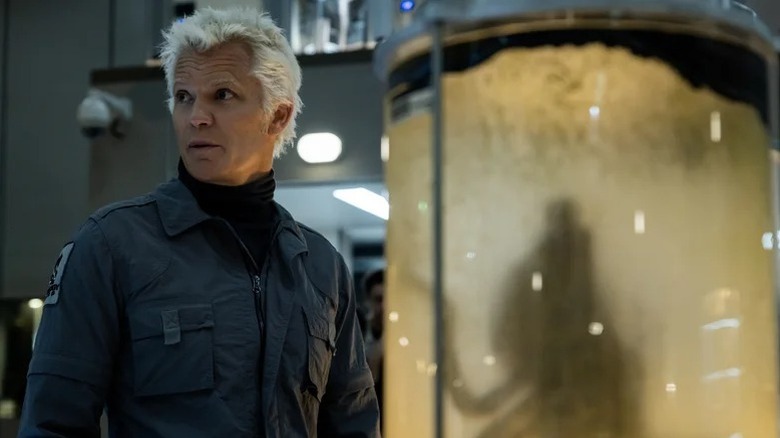Alien: Earth Plot Points That Eerily Mirror Real Life
"Alien: Earth" adds yet another puzzle piece to the greater "Alien" story. In case anyone wondered where it fits into the franchise's timeline, the FX show takes place in 2120 — two years before the events of the first "Alien" film, where Sigourney Weaver's Ellen Ripley had to teach a pesky Xenomorph who's the boss. At this point in time, humanity is more technologically advanced, with space expeditions deemed regular occurrences and the presence of cyborgs and synthetics seen as totally natural among humanity.
What's most harrowing about "Alien: Earth" is how several of its plot points mirror real life at present. It shouldn't surprise anyone, though, since showrunner Noah Hawley loves to inject his series with rich, current themes and topics. Just ask anyone who watched "Legion" and "Fargo" and found themselves having existential and philosophical water cooler discussions with other fans on a weekly basis. With that being said, let's take a look at the moments in "Alien: Earth" that made our hair stand on end, because of how they hit too close to home.
Major corporations take over the world
In "Alien: Earth," five corporations run the world: Weyland-Yutani, Prodigy, Dynamic, Threshold, and Lynch. These big companies make the decisions that impact ordinary citizens; however, it doesn't take a rocket scientist to see that their main concerns are profit and competitive advantage. The well-being of average citizens doesn't factor at all.
When Prodigy finds out about Weyland-Yutani's specimens (alien creatures) onboard the USCSS Maginot, Prodigy CEO Boy Kavalier (Samuel Blenkin) wants to get his grubby hands on them, too. Yet, both of these corporations play a dangerous game, bringing these perfect organisms of destruction to Earth for their own gain. Ultimately, innocent people die because of their callousness, while everyone who has watched the rest of the "Alien" movies knows that Weyland-Yutani can't help itself and continues to obsess over the Xenomorphs.
It sounds like a nightmare scenario, but the truth is that real life isn't too far behind "Alien: Earth." In fact, there are already a handful of companies you didn't realize run the world. Competition continues to be stamped out, as large corporations merge into even greater juggernauts while smaller companies fizzle out. In the case of Big Tech, it's becoming even more alarming as corporations and high-profile figures cozy up to politicians and governments — look at Elon Musk's campaigning and influence during America's 2024 presidential election as a prime example. The next logical step is that Big Tech becomes the one calling the shots — if we aren't there already.
The rise of transhumanism
Cyborgs and synthetics are part of the world in "Alien: Earth." In terms of the former, they're humans with enhanced cybernetic parts, while the latter is artificial intelligence inside android bodies. However, Prodigy introduces a revolutionary development on the show: hybrids. Prodigy CEO Boy Kavalier discovers a way to put human consciousness into a synthetic body. He seeks out children who have life-threatening illnesses or experienced damage to their bodies, then he transplants their consciousness into a new, enhanced physical vessel.
Transhumanism isn't a new concept by any means. Humans have long sought ways to use technology to prolong their lives, or upgrade their current states, as part of humanity's never-ending quest to achieve immortality and live forever. However, we might be closer to Prodigy's revolutionary technological discovery than anyone could have ever imagined.
In 2018, it was revealed that OpenAI CEO Sam Altman had joined the waiting list for a company called Nectome, which plans to preserve the human brain and upload it onto a data server, allowing the mind to live forever even if the body doesn't. As Altman told MIT Technology Review, he foresees this becoming a possibility in the not-too-distant future. "I assume my brain will be uploaded to the cloud," Altman said. So, if the brain can be uploaded to the cloud, the next logical step would be to hook it up to an android body. Then, bingo! A hybrid is born.
The marginalization of society due to artificial intelligence
What's abundantly clear about "Alien: Earth" is how artificial intelligence plays a major role in 2120. It isn't just used to further scientific discovery but is also present in daily life. Look at Wendy (Sydney Chandler) and the other hybrids, for example: they're children in adult bodies, but the individual who guides them is Timothy Olyphant's Kirsh, a synthetic android. Where are the humans here?
It's a worrisome characteristic in "Alien: Earth," as human beings appear to be marginalized in favor of AI. As it turns out, modern-day society looks to be on the same path toward this bleak future. OpenAI's Sam Altman predicted in 2024 that super-intelligent AI isn't too far away, which will surpass anything that humans can do and usher in a brand-new revolution. Others, such as Microsoft's AI CEO Mustafa Suleyman, have warned that we might be on a crash course toward disaster if we attempt to turn AI into a conscious being. Humans have already developed chilling attachments to AI chatbots and are asking these programs for life advice, and it's only set to get worse if these developments replace actual humans.
"So much of the technologists and billionaires these days grew up watching sci-fi, reading sci-fi," Noah Hawley told The Hollywood Reporter. "As a maker of sci-fi, I think it's our responsibility to try to provide a future that we can work toward."



